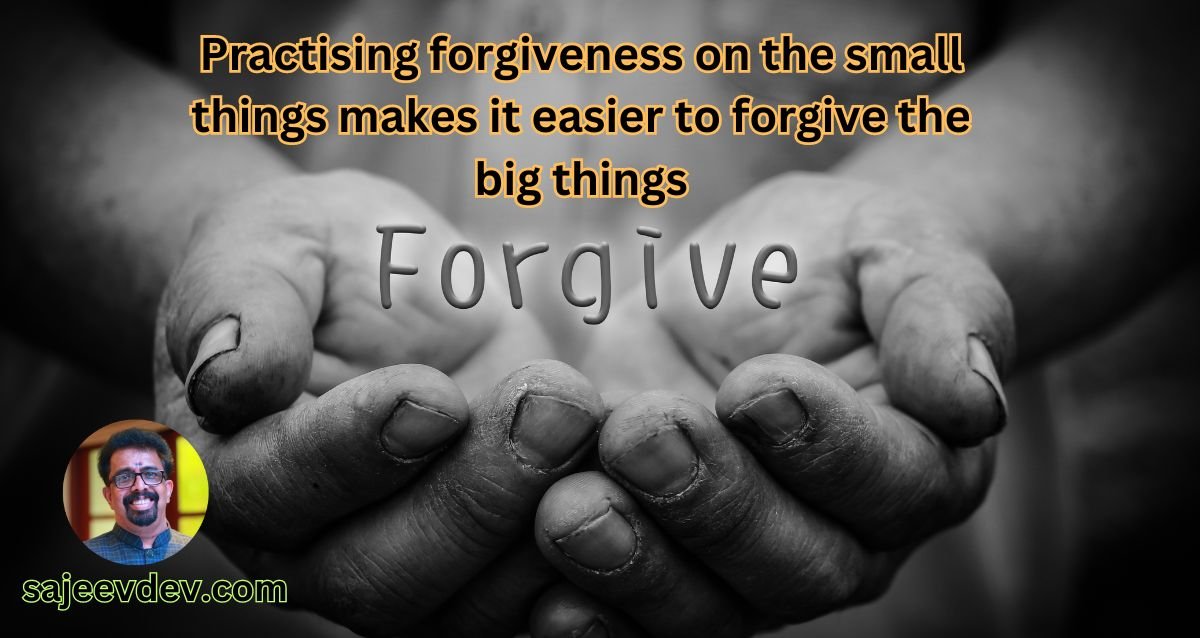Forgiveness is a concept deeply intertwined with mental and emotional well-being
Forgiveness is a concept deeply intertwined with mental and emotional well-being, often misunderstood and underestimated in its power to heal. Contrary to common misconceptions, forgiveness is not a sign of weakness; on the contrary, it represents a profound act of strength and resilience. The act of forgiving allows individuals to free themselves from the burdens of anger, resentment, and hurt, paving the way for emotional liberation.
Forgiveness involves a conscious decision to release feelings of vengeance or revenge against someone who has wronged us. This decision is not synonymous with condoning the offense or forgetting it, but rather, it signifies an inner transformation where the individual attains peace while relinquishing the hold the transgression has on them. This process is crucial because harboring grudges or persistent negative emotions can exacerbate stress, anxiety, and depression, thereby undermining one’s overall well-being.
The journey toward forgiveness begins with addressing smaller grievances. By practicing forgiveness on the small things, such as everyday misunderstandings or minor disputes, individuals can build a more robust capacity for forgiveness. This gradual cultivation of forgiveness fosters emotional resilience and primes the individual for handling more significant transgressions with a balanced and compassionate mindset. Such practice ensures that when faced with more profound betrayals or hurts, the act of forgiveness is not as insurmountable as it might otherwise seem.
Ultimately, forgiveness is not just about the person who has caused the pain; it is largely about the individual who chooses to forgive. It is a gift one gives to oneself, an intentional step toward emotional freedom and well-being. Embraced rightly, forgiveness can transform not only personal relationships but also one’s overall approach to life, enriching the individual’s sense of peace and purpose.
The Psychological Benefits of Forgiveness
Forgiveness is a significant psychological process that yields numerous mental health benefits. Studies have shown that the act of forgiving others can lead to reduced levels of stress, anxiety, and depression. According to research conducted by Dr. Fred Luskin, Director of the Stanford Forgiveness Projects, forgiveness can lead to a decrease in negative emotions and an increase in positive feelings, such as empathy and hope. This emotional shift is essential for overall well-being and mental resilience.
Practicing forgiveness, even in minor incidents, helps in the conditioning of the mind to handle more substantial grievances in the future. When people forgive, their bodies can lower stress hormone levels, such as cortisol, which contributes to a calmer state of mind. This physiological response can improve mood and diminish anxiety, creating a sense of relief and emotional balance.
Expert opinions also suggest that forgiveness fosters healthier relationships. By letting go of anger and resentment, individuals are better equipped to communicate with others effectively, promoting social harmony and mutual respect. Furthermore, forgiveness can break the cycle of hatred and vengeance, leading to a more peaceful and connected community.
It is important to note that the benefits of forgiveness are not solely restricted to the person being forgiven but also extend significantly to the forgiver. Engaging in everyday acts of forgiveness enables individuals to build a habit of resilience against emotional disturbances, making it easier to cope with more severe conflicts as they arise. In addition, this habitual practice can fortify one’s capacity for compassion and understanding, laying a robust foundation for personal growth and emotional maturity.
Therefore, forging a path towards forgiveness, starting from small transgressions, is not only a step towards resolving individual conflicts but also a profound journey towards psychological well-being and inner peace.“`html
Examples of Small Forgiveness Opportunities
In our daily lives, we often encounter situations that test our patience and require us to practice forgiveness. Take for example when a friend cancels plans at the last minute. While it can be frustrating, understanding that unforeseen circumstances arise can help us cultivate a forgiving attitude. This small act of forgiveness not only smooths over the immediate situation but also prepares us for more significant instances where forgiveness is needed.
Another common scenario occurs in the workplace. Imagine a co-worker takes credit for a minor part of your work during a team meeting. Instead of harboring resentment, choosing to let go of the grudge can lead to a healthier work environment. Addressing the issue calmly and giving them the benefit of the doubt transforms the situation into an opportunity for forgiveness, thereby reinforcing a positive and collaborative demeanor.
Moreover, family interactions frequently bring up opportunities for small-scale forgiveness. A thoughtless comment from a family member might sting, but choosing to look beyond the words to the intention behind them can foster understanding and pave the way for forgiveness. Regularly practicing forgiveness in these minor moments builds emotional resilience, making it easier to handle more significant grievances in the future.
These frequent, minor instances serve as practice grounds for developing a forgiving mindset. They allow us to test and refine our responses, promoting empathy and reducing the emotional toll of holding onto negativity. Over time, practicing forgiveness in these small ways prepares us to face larger challenges with a more composed and compassionate approach. Each small act of forgiveness contributes to an overarching ability to forgive, forging a path toward inner peace and healthier relationships.
Techniques for Practicing Small Forgiveness
Practicing forgiveness starts with small gestures and exercises that gradually build a forgiving mindset. Several techniques can aid individuals in this journey. Mindfulness exercises, for example, can be a crucial tool. By engaging in mindful practices, one becomes more attuned to their emotions, leading to better management of feelings such as anger and resentment. Mindfulness involves being present in the moment and acknowledging these emotions without judgment.
Journaling is another effective technique for practicing small forgiveness. By writing down one’s thoughts and feelings, individuals can gain clarity and a greater understanding of their emotional responses. Journaling allows for reflection on incidents that caused minor distress and encourages letting go of negativity. This practice cultivates a compassionate orientation towards oneself and others, aiding the forgiveness process.
Meditation is a complementary approach, providing a structured way to calm the mind and relax the body. Guided meditations focused on forgiveness can help individuals gradually release grudges and ill feelings. Regular meditation practice fosters a sense of inner peace, which is instrumental in developing a forgiving nature.
Understanding the other person’s perspective is another pivotal technique. This involves empathizing with the source of the hurt and considering their reasons for their actions. It requires stepping out of one’s own emotions and putting oneself in another’s shoes. This shift in perspective can significantly ease the process of forgiveness, as it highlights the shared human experience of making mistakes and needing forgiveness.
Consistently applying these techniques can aid in building a habit of forgiveness. Over time, these small acts of forgiving can accumulate, making it easier to extend forgiveness in more significant situations. The regular practice of mindfulness, journaling, meditation, and empathetic understanding nurtures a forgiving mindset, allowing individuals to navigate life’s challenges with greater compassion and resilience.
Transformative Power of Small Forgiveness
Practicing forgiveness for minor infractions may seem inconsequential at first glance, yet its impact on our overall emotional well-being is profound. By consistently choosing to forgive small slights—such as a friend’s forgotten promise or a co-worker’s sharp comment—we begin to cultivate a mindset oriented towards compassion and understanding. This consistent practice of small forgiveness can significantly change one’s outlook on life, making it more positive and resilient.
One of the key benefits of forgiving minor offenses is the improvement it brings to our relationships. When we let go of petty grievances, we allow space for empathy and a deeper connection with others. Over time, this fosters stronger, more meaningful relationships built on trust and mutual respect. This ripple effect can transform the dynamics of both personal and professional interactions, creating a more harmonious and supportive environment.
Additionally, engaging in small acts of forgiveness enhances self-esteem. Holding onto minor resentments can accumulate, leading to unnecessary stress and self-doubt. When we forgive, even in seemingly trivial situations, we affirm our capacity for grace and kindness, thus bolstering our self-worth. By acknowledging our own imperfections and extending forgiveness, we can alleviate internal conflicts and foster a healthier self-image.
Emotional stability is another crucial benefit of practicing small forgiveness. By regularly releasing negative emotions associated with minor offenses, we reduce the emotional burden that can otherwise lead to feelings of bitterness and anxiety. This habit helps in maintaining a balanced emotional state, enabling us to cope better with life’s challenges. When faced with significant adversities, our well-practiced ability to forgive on a smaller scale equips us with the emotional resilience needed to tackle larger issues.
In essence, the practice of forgiving minor infractions leads to a transformative ripple effect. It not only improves immediate relationships and boosts self-esteem but also prepares us for more significant challenges with a stable and open heart. By nurturing a habit of small forgiveness, we lay the groundwork for a more forgiving and emotionally healthy existence, capable of handling life’s bigger trials with grace.
Case Studies and Personal Stories
To truly grasp the transformative power of practicing forgiveness on small matters, let’s delve into some illustrative case studies and personal stories. These examples highlight the shift from harboring minor grievances to achieving a state of emotional freedom through forgiveness, setting a solid foundation for addressing larger offenses.
Consider Sarah, an anonymous individual who faced daily frustrations with a close colleague, Mark. Mark had a habit of interrupting her during meetings, which left Sarah feeling undervalued and disrespected. Initially, Sarah chose to bottle up her resentment, resulting in mounting tension and stress. However, after attending a workshop on forgiveness, Sarah decided to confront her feelings. She employed small forgiveness techniques, like taking deep breaths and mentally reminding herself of Mark’s positive qualities. Over time, Sarah noticed a significant improvement in their professional relationship. Her ability to forgive minor interruptions translated into a broader sense of ease and collaboration.
Similarly, let’s examine a hypothetical scenario involving John, who had a strained relationship with his younger brother, Sam. The source of John’s frustration was Sam’s chronic habit of borrowing items without returning them. This seemingly minor issue festered over the years, leading to frequent arguments and emotional distance. John decided to take a different approach by practicing small acts of forgiveness. Each time Sam borrowed something without asking, John consciously let go of his irritation and communicated his feelings calmly. Gradually, the brothers rebuilt trust, which proved invaluable when a more significant family dispute arose. Their strengthened bond, rooted in small acts of forgiveness, enabled them to navigate the challenging situation with greater understanding and empathy.
These stories underscore the practical benefits of practicing forgiveness on the small things. By addressing minor grievances with compassion and patience, individuals like Sarah and John laid the groundwork for handling more substantial issues gracefully. Their experiences highlight a compelling truth: forgiveness, nurtured in everyday interactions, cultivates resilience and emotional well-being, ultimately making it easier to forgive the bigger transgressions.
Overcoming Obstacles to Forgiveness
Forgiveness, though often lauded as a virtuous trait, is seldom easy to practice. Various obstacles can impede one’s ability to forgive, even in seemingly trivial matters. Prominent among these impediments are pride, the fear of appearing weak, and the desire for revenge. Each of these hurdles demands a nuanced approach to overcome, rooted deeply in self-awareness and personal growth.
Pride is a significant barrier to forgiveness. This often manifests as an unwillingness to admit vulnerability or a stubborn adherence to one’s own sense of justice. To combat this, individuals must cultivate a mindset of humility. Embracing the notion that everyone makes mistakes can help dismantle the rigid barriers of pride. Reflecting on one’s own imperfections fosters empathy and allows for a more compassionate perspective toward those who may have wronged us.
Another common obstacle is the fear of appearing weak. Forgiving someone might be misinterpreted as condoning their behavior or as a sign of submission. However, it is crucial to understand that forgiveness is not about excusing the offense but rather about freeing oneself from the shackles of bitterness. Building internal strength and self-confidence can mitigate these fears. When one feels secure in their own worth, the act of forgiveness becomes a testament to inner resilience rather than a display of weakness.
Lastly, the desire for revenge often stands in the way of forgiveness. The notion of retribution can be intoxicating, offering a false sense of justice. Nonetheless, this path usually leads to prolonged suffering for both parties involved. Strategies such as mindfulness and meditation can be effective in managing these vengeful impulses. These practices encourage introspection and highlight the benefits of emotional release over holding grudges.
By recognizing and addressing these common obstacles, individuals can create a foundation for forgiving minor transgressions, thus paving the way for more significant acts of forgiveness in the future. The journey toward effective forgiveness is a continuous process of self-awareness and personal growth, ultimately leading to a more peaceful and harmonious existence.
Call to Action
Throughout this blog post, we have explored the significance of practicing forgiveness in our day-to-day lives. Embracing forgiveness for minor grievances serves as a foundation for emotional well-being and builds the mental resilience required to extend forgiveness in more significant, challenging situations. By forgiving small matters, we can significantly enhance our emotional health, reduce stress, and improve our relationships.
These daily practices of forgiveness allow us to cultivate a forgiving mindset. This, in turn, fortifies our capacity to handle deeper emotional wounds effectively. The continuous engagement in forgiving minor infractions helps in developing patience, empathy, and the ability to let go of grudges, fostering a healthier and more positive mental state.
We encourage you to integrate these forgiveness practices into your daily routine. Start small—recognize minor offenses, understand the context, and consciously choose to forgive. As you build this habit, you’ll likely find yourself more equipped to handle significant issues that arise, with a calmer and more balanced demeanor.
By observing these positive changes in your mental and emotional well-being, you will likely see an improvement in your overall quality of life. Forgiveness, even on a small scale, paves the way for emotional growth and a more compassionate outlook toward others and yourself. Let this practice become part of your daily life, and witness the transformation in how you manage conflicts, perceive emotions, and maintain interpersonal relationships.
Make the commitment today to practice forgiveness, for both small and large matters, and experience the profound impact it can have on your mental resilience and emotional health. Your journey towards a more peaceful and emotionally balanced life starts with the seemingly small step of forgiving the little things.









